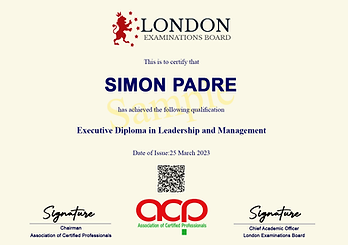PROGRAMME AIMS
This Executive Diploma in Leadership and Management is designed to gain understanding, knowledge, and the know how to manage the performance elements of a workforce. Gain coaching skills and know the techniques used to lead and build more effective teamwork in an organization. It is designed to equip those who are keen to take up employment in Management within the business sector. Those who are keen to further their education can progress on to either the Higher Diploma in Business Management or gain entry and acceptance into Year 2 of a Bachelor degree.
PROGRAMME STRUCTURE
The Executive Diploma in Leadership and Management comprises of three modules. Executive Diploma in Leadership and Management is a professional diploma delivered in a manner that gives you the flexibility to learn at a time and place that suits your personal and work life. You can embark immediately on an Executive Diploma in Leadership and Management knowing you can fit it into your schedule.
3 core modules 60 credits
- Performance Management – 20 Credits
- Coaching Skills – 20 Credits
- Team Building – 20 Credits
DELIVERY MODE
Mode A: Blended Learning mode
Available at selected Approved Learning Centres where classes are held plus learners are given a complete set of learning materials to facilitate independent study which can be accessed through our designated Learning Portal.
For each module we recommend that Approved Learning Centres provide between 6 and 12 hours of lectures/tutorials and that you spend at least 12 hours learning online.
Mode B: Fully Online mode
Learners are given a complete set of learning materials to facilitate independent study which can be accessed through our designated Learning Portal. For each module, we recommend at least 24 hours of online learning.
ADMISSION CRITERIA
An applicant may be admitted on the basis of evidence to suggest that he or she will be able to fulfill and benefit from the objectives of the programme and achieve the standard required for the award.
Summary of Entry Requirements
No prior knowledge is required. Applicants should normally be at least 16 years old and preferably with the following:
- Level 3 (QCF/RQF) Certificate;
- 4 GCSEs at grade C or above; or
- Working adults.
Advanced Standing / Exemptions / Credits Transfer (APL)
Consideration for the above for learners admitted onto the programme may be considered either at the beginning of a programme, or beyond the beginning of a programme, through an assessment of that learner’s prior learning, whether certificated or un-certificated. The process for making such a decision is known as the Accreditation of Prior Learning (APL) is a matter of academic judgment exercised by the appointed panel considering applications and approvals of APL. Where cohorts of learners are to be admitted with advanced standing on a regular basis, the arrangement should be subject to an Academic Progression Agreement.
ASSESSMENT STRUCTURE
Comprehensive Multiple Choice Questions (“MCQs”)
The mode of assessment is a carefully designed MCQs consisting of 50 MCQs to be taken either online or in a proctored paper-based final examination at approved centres. The duration of this final assessment will be 1.5 hours. The MCQ will serve to validate the attainment of broad understanding and application of knowledge by learners is related to the intended learning outcomes.
UNIT SPECIFICATION
Participants will be awarded an Executive Diploma in Leadership and Management upon completion of the 3 Modules in Performance Management, Coaching Skills, and Team Building.
1. Performance Management
Learning Outcomes
On completion of this Module learners will be able to:
- Articulate key knowledge required to undertake application of the Performance Management.
- Use the required techniques and tools to ensure the effective application of Performance Management in an organizational context.
Topics covered include:
- What is Performance Management?
- The Elements of a Performance Management System
- The Objectives of Performance Management
- The Performance Management Process
- The Key to Performance Management
- The differences between Performance Appraisal and Performance Management
- The various Performance Appraisal Methods
- The Steps in Writing Performance and Goals
- The Tips for Successful Performance Management
- What are Key Performance Indicators?
- The Challenges of Performance Management
- Sources of Errors in Performance Management
2. Coaching Skills
Learning Outcomes
On completion of this Module learners will be able to:
- Articulate key knowledge required to undertake application of coaching in a business context
- Use the required techniques and tools to ensure the effective coaching in an organizational and business context.
Topics covered include:
- Coaching – Introduction and Background
- Coaching principles and characteristics
- Important concepts of coaching
- Coaching models
- Types of coaching and coaching styles
- Coaching sessions and approaches
3. Team Building
Learning Outcomes
On completion of this Module learners will be able to:
- Examine key knowledge required to undertake effective Team Building.
- Use the required models, tools and practices to ensure effective Tram Building in an organizational context.
Topics covered include:
- What is a Team?
- The Differences between Group and Team
- The Characteristics of a Team
- What is Team Work?
- The Various Team Models
- The Various Types of Teams
- The Stages of Team Development
- Effective Team Management Skills
- What is Team Building?
- The Team Building Exercises
- What is a Team Contract?
- Rules for Participation & Communication
- The Role of Team Leaders in Team Building
- Why Teams Fail?
- How do you keep a team from falling apart?

